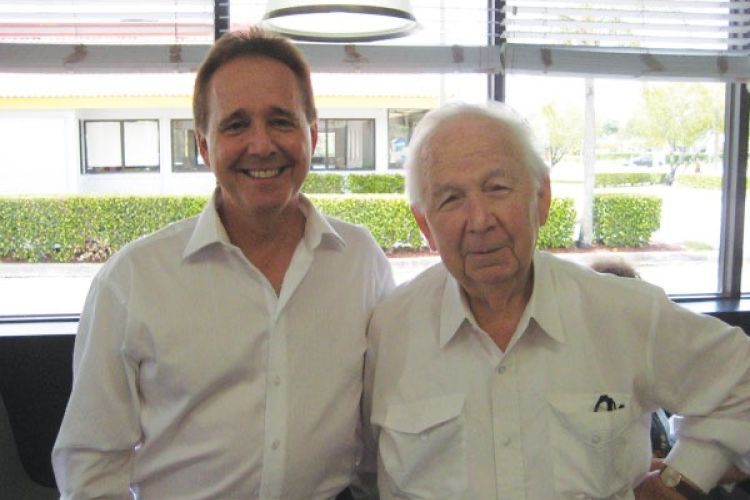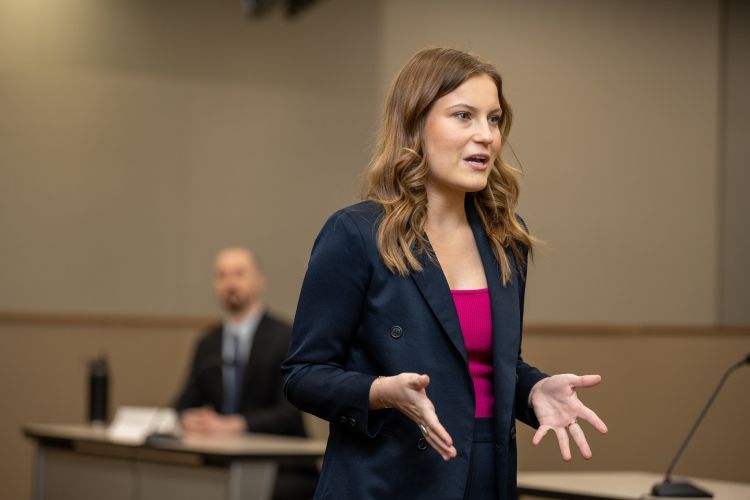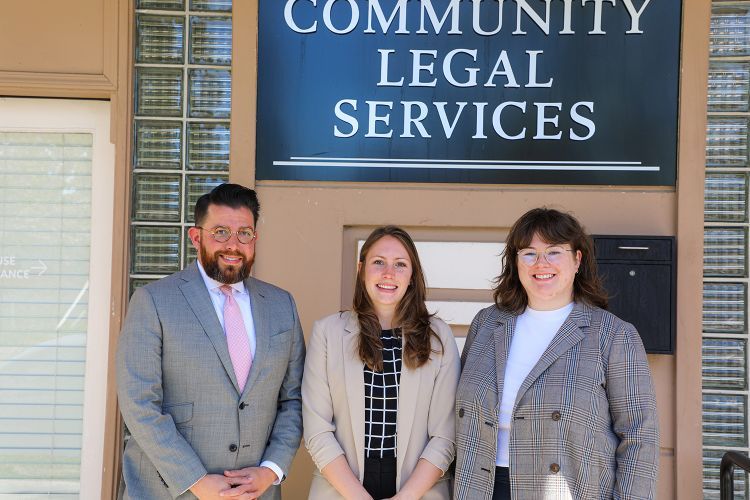Breadcrumb
Three McGeorge School of Law professors literally wrote the book . . . and they designed the textbook series too
McGeorge School of Law prides itself on being at the forefront of law teaching and learning, and our faculty continues to prove it. Associate Dean for Scholarship Franklin Gevurtz, Distinguished Professor Mike Vitiello, and Dean Michael Hunter Schwartz each created, published books for, and continue to serve as the editors of their own textbook series.
While writing a textbook, in general, is a huge undertaking, creating and editing a textbook series offered a very different set of challenges to the authors. Fortunately for these professors, they are experts in their fields. Gevurtz is, in the words of the United States Court of Appeals for the Ninth Circuit, a "leading commentator" on corporate law. Vitiello utilizes his 40+ years of teaching to guide his series on bridging classroom theory to practice. Dean Schwartz has delivered more than 200 professional presentations about teaching and learning in law school, and he has authored five books on teaching and learning in law school; he uses all of his knowledge and expertise to inform the modernized casebook series he created.

Franklin Gevurtz serves as the Associate Dean for Scholarship and a Distinguished Professor of Law at McGeorge School of Law. He developed and serves as series editor for the 23-volume Global Issues book series.
Franklin Gevurtz, Global Issues
Distinguished Professor Gevurtz both developed and serves as series editor for the revolutionary 23-volume Global Issues book series. The Global Issues books are supplemental texts that were designed to be paired with traditional casebooks. The series responds to the growing impact of globalization on legal practice by facilitating the introduction of international and comparative law issues in core law school courses. Gevurtz
“This was an effort to make sure that all law students had some exposure to matters dealing with international law and comparative law,” Gevurtz reflected.
Rather than requiring a separate class on international issues, the book series plays a pivotal role in integrating international issues throughout the curriculum.
“The idea is that future lawyers need to think about international law not as a separate silo, but instead be aware of this as part of a number of things that a practicing attorney might encounter in all kinds of places you do not expect. International public law and transnational law, for example, can play an important role in such a seemingly domestic area as family law,” Gevurtz said. This pioneering idea of integrating a cross-cutting topic throughout courses rather than confining it to a silo of its own course is being adopted for other topics as well, as most recently seen with concerns of diversity, equity, and inclusion.
The idea caught the attention of West Academic Publishing. As more professors grew interested, the series grew from three, to five, and ultimately to 23 books on a variety of different topics.
Researching each book and relying on international sources was not without its challenges. Gevurtz is the author of the 2006 book on Corporate Law.
“I had to piece together three separate sources in order to get a translation of one German court opinion suitably edited for a casebook,” Gevurtz said. “You have to look around and be creative with various resources, and write reasonably detailed yet assessable textual material describing the broader context, to a greater extent than in casebooks dealing with domestic law.”
Gevurtz also co-authored the 2013 book on Securities Law with Marc I. Steinberg and Eric Chaffee. McGeorge faculty authored or co-authored 13 volumes in the 23-volume series.

Michael Hunter Schwartz is the Dean and a Professor of Law at McGeorge School of Law. Schwartz is the series designer and editor for the 27-volume Context and Practice Casebooks.
Michael Hunter Schwartz, Context and Practice Casebooks
Dean Schwartz published the first edition of “Contracts: A Context and Practice Casebook” in 2009, which was the first book in a textbook series that he designed in an effort to modernize law school casebooks. It quickly became clear to him that the model would work for most, if not all, law school subjects, and Schwartz proposed a series to the publisher.
“Once I had finished the book, it became clear to me that the model was different enough to warrant a casebook series,” Schwartz said. The Context and Practice Casebook series, published by Carolina Academic Press, consists of 27 books authored by faculty members representing 32 different law schools. As the series designer and editor, Schwartz recruited nearly all of the authors based on their expertise as teachers.
“I believed that students deserved better books that reflected knowledge of modern brain science and were distinctly focused on how people learn, what lawyers do, and how lawyers work,” Schwartz explains.
Each book is authored by a teaching expert and is therefore informed by best practices in instructional design and teaching and learning theory. In addition, each strives to implement the recommendations for integrating authentic law practice experiences from the Clinical Legal Education Association’s “Best Practices for Legal Education” and the Carnegie Foundation’s “Educating Lawyers: Preparation for the Practice of Law.”
Schwartz describes the process of writing the book as “joyous.”
“I started the book by writing a chapter for a class I was taking on learning theory and instructional design at a then-local community college,” he said. “I chose to write the chapter to apply what I had learned to design teaching materials for an aspect of contract law, illusory promise, that tends to confuse students, and my goal was to create materials that allowed students to deeply learn the material and reflected what I had learned about learning theory and instructional design.”
Writing that chapter inspired Schwartz to continue learning about learning theory and instructional design, as well as to write the contracts book. Schwartz published the third edition of the book in 2020. He is currently working on a fourth edition of the contracts book, which has been adopted by law professors all over the country.

Michael Vitiello is a Distinguished Professor of Law at McGeorge School of Law. Vitiello is the senior editor for the 17-volume "The Bridge to Practice" series.
Michael Vitiello, The Bridge to Practice
Vitiello is the senior editor for a series of simulation books published by West Academic. That series, "The Bridge to Practice," allows professors to integrate skills training into traditional classrooms. He has published three books in that series, which he uses in the three principle courses he teaches: Criminal Law (2015), Criminal Procedure (2021), and Civil Procedure (2023).
"The Bridge to Practice" series was created when the Carnegie Foundation published an influential book entitled “Educating Lawyers: Preparation for the Profession of Law.” It called upon law schools to add great emphasis on the practical application of the law through experiential education. Around the time that the book was published, law firms began looking to hire new associates who needed less post-law school training in practical skills.
Because of developments like these, Vitiello was able to convince West Academic Publishing to publish a series of simulation books.
“Excellent casebooks already have been published in those fields,” Vitiello explains. “My hope was to inspire users of traditional casebooks to add simulation material. In my Teachers’ Manuals, I explain how to integrate the simulations into traditional casebooks and classrooms.”
To date, West Academic has published 17 books in the series, ranging from Civil Procedure to Bankruptcy to Trusts and Estates.
“In creating many documents involving, say, a deposition or trial testimony of a witness or a role summary, I would find myself taking on the voice of the character. The characters whom I created came to life in the writing process,” Vitiello said.
Vitiello explains that he expands his knowledge of the law as he writes.
“To make some of the material work, I found myself researching areas of the law that were new to me, expanding my appreciation of the subject matters,” Vitiello said.
Learn more about faculty impact at McGeorge School of Law.
For more information about McGeorge School of Law, visit our website.
Media Contacts:
- Ashley Golledge, Director of Marketing and Communications, agolledge@pacific.edu, 916.325.4687
- Victoria Ambriz, Marketing Coordinator, vambriz@pacific.edu, 916.325.4631
- Alex Banks, Communications Coordinator, abanks@pacific.edu, 916.520.7479





